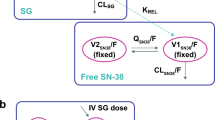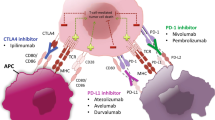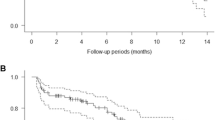Abstract
Background
CT-P16 is a candidate biosimilar of bevacizumab, a monoclonal antibody targeting vascular endothelial growth factor that is used in the treatment of a range of advanced solid cancers.
Objective
The objective of this study was to demonstrate the pharmacokinetic equivalence of CT-P16 and European Union (EU)-approved bevacizumab (EU-bevacizumab) and US-licensed bevacizumab (US-bevacizumab) reference products.
Methods
In this double-blind, parallel-group phase I trial (ClinicalTrials.gov identifier NCT03247673), healthy adult males were randomized (1:1:1) to receive a single dose of CT-P16 5 mg/kg, EU-bevacizumab 5 mg/kg, or US-bevacizumab 5 mg/kg. Primary study endpoints were area under the concentration–time curve (AUC) from time zero to infinity (AUC∞), AUC from time zero to the last quantifiable concentration (AUClast), and maximum serum concentration (Cmax). Pharmacokinetic equivalence was shown if the 90% confidence intervals (CIs) of the geometric mean (GM) ratios of the AUC∞, AUClast, and Cmax were within the predefined bioequivalence margin of 80–125%. Safety and immunogenicity were also evaluated.
Results
A total of 144 subjects were randomized: 47 to CT-P16, 49 to EU-bevacizumab, and 48 to US-bevacizumab. The 90% CIs for the GM ratios of AUC∞, AUClast, and Cmax for CT-P16/EU-bevacizumab, CT-P16/US-bevacizumab, and EU-bevacizumab/US-bevacizumab comparisons were all within the bioequivalence margin. Mean serum concentration–time profiles, secondary pharmacokinetic parameters, and safety and immunogenicity profiles were comparable across all three treatment groups.
Conclusion
CT-P16 demonstrated pharmacokinetic equivalence to EU-bevacizumab and US-bevacizumab. Safety and immunogenicity profiles were similar for CT-P16, EU-bevacizumab, and US-bevacizumab. These data support the further clinical evaluation of CT-P16 as a bevacizumab biosimilar.
Clinical Trials Registration
NCT03247673.


Similar content being viewed by others
References
Niu G, Chen X. Vascular endothelial growth factor as an anti-angiogenic target for cancer therapy. Curr Drug Targets. 2010;11(8):1000–17.
Midgley R, Kerr D. Bevacizumab–current status and future directions. Ann Oncol. 2005;16(7):999–1004.
Ranieri G, Patruno R, Ruggieri E, Montemurro S, Valerio P, Ribatti D. Vascular endothelial growth factor (VEGF) as a target of bevacizumab in cancer: from the biology to the clinic. Curr Med Chem. 2006;13(16):1845–57.
Baluk P, Hashizume H, McDonald DM. Cellular abnormalities of blood vessels as targets in cancer. Curr Opin Genet Dev. 2005;15(1):102–11.
Kazazi-Hyseni F, Beijnen JH, Schellens JH. TEST Bevacizumab. Oncologist. 2010;15(8):819–25.
Amit L, Ben-Aharon I, Vidal L, Leibovici L, Stemmer S. The impact of bevacizumab (Avastin) on survival in metastatic solid tumors–a meta-analysis and systematic review. PLoS One. 2013;8(1):e51780.
European Medicines Agency. Avastin Summary of Product Characteristics. 2018. https://www.ema.europa.eu/documents/product-information/avastin-epar-product-information_en.pdf. Accessed 22 Nov 2018.
United States Food and Drug Administration. Avastin prescribing information. 2018. https://www.gene.com/download/pdf/avastin_prescribing.pdf. Accessed 22 Nov 2018.
Buske C, Ogura M, Kwon HC, Yoon SW. An introduction to biosimilar cancer therapeutics: definitions, rationale for development and regulatory requirements. Future Oncol. 2017;13(15s):5–16.
European Medicines Agency. Guideline on similar biological medicinal products containing biotechnology-derived proteins as active substance: non-clinical and clinical issues. 2014. https://www.ema.europa.eu/documents/scientific-guideline/guideline-similar-biological-medicinal-products-containing-biotechnology-derived-proteins-active_en-2.pdf. Accessed 22 Nov 2018.
United States Food and Drug Administration. Guidance for industry: scientific considerations in demonstrating biosimilarity to a reference product. 2015. https://www.fda.gov/downloads/drugs/guidances/ucm291128.pdf. Accessed 22 Nov 2018.
Knight B, Rassam D, Liao S, Ewesuedo R. A phase I pharmacokinetics study comparing PF-06439535 (a potential biosimilar) with bevacizumab in healthy male volunteers. Cancer Chemother Pharmacol. 2016;77(4):839–46.
Markus R, Chow V, Pan Z, Hanes V. A phase I, randomized, single-dose study evaluating the pharmacokinetic equivalence of biosimilar ABP 215 and bevacizumab in healthy adult men. Cancer Chemother Pharmacol. 2017;80(4):755–63.
Wynne C, Schwabe C, Batra SS, Lopez-Lazaro L, Kankanwadi S. A comparative pharmacokinetic study of DRL_BZ, a candidate biosimilar of bevacizumab, with Avastin® (EU and US) in healthy male subjects. Br J Clin Pharmacol. 2018;84(10):2352–64.
Zhang H, Li Q, Zhu X, Li C, Li X, Liu C, et al. Tolerance, variability, and pharmacokinetics of bevacizumab biosimilars in Chinese healthy male subjects. Cancer Chemother Pharmacol. 2018;82(4):615–23.
European Medicines Agency. Committee for Medicinal Products for Human Use (CHMP). Guideline on the investigation of bioequivalence. London, January 20. CPMP/EWP/QWP/1401/98 Rev. 1/Corr**. 2010. https://www.ema.europa.eu/documents/scientific-guideline/guideline-investigation-bioequivalence-rev1_en.pdf. Accessed 12 Oct 2018.
Acknowledgements
We thank all study investigators, staff, and subjects who contributed to this study. Medical writing support (including development of a draft outline and subsequent drafts in consultation with the authors, assembling tables and figures, collating author comments, copyediting, fact checking, and referencing) was provided by Emma Evans Ph.D., CMPP and Rick Flemming Ph.D., CMPP at Aspire Scientific Limited (Bollington, UK), and funded by CELLTRION, Inc. (Incheon, Republic of Korea).
Author information
Authors and Affiliations
Contributions
S-HC, SH, SY, TP, M-SN, and J-GS were involved in the conception and/or design of this study. J-LG, SY, TP, SK, and JB were involved in the acquisition, analysis, and/or interpretation of the data. All authors contributed to development of the manuscript and approved the final version for submission.
Corresponding author
Ethics declarations
Funding
This study was sponsored by CELLTRION, Inc. (Incheon, Republic of Korea).
Conflict of Interest
SY, TP, SK, and JB are employees of CELLTRION, Inc. SY has stock in CELLTRION, Inc. S-HC, SH, J-LG, M-SN, and J-GS have no conflicts of interest to declare.
Ethical Approval
All procedures performed in studies involving human participants were in accordance with the ethical standards of the institutional and/or national research committee and with the 1964 Helsinki Declaration and its later amendments or comparable ethical standards.
Informed Consent
Informed consent was obtained from all individual participants included in the study.
Electronic supplementary material
Below is the link to the electronic supplementary material.
Rights and permissions
About this article
Cite this article
Cho, SH., Han, S., Ghim, JL. et al. A Randomized, Double-Blind Trial Comparing the Pharmacokinetics of CT-P16, a Candidate Bevacizumab Biosimilar, with its Reference Product in Healthy Adult Males. BioDrugs 33, 173–181 (2019). https://doi.org/10.1007/s40259-019-00340-x
Published:
Issue Date:
DOI: https://doi.org/10.1007/s40259-019-00340-x




